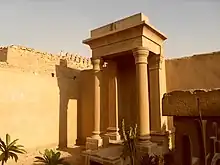Salama Hegazi
Salama Ibrahim Hegazi (Arabic: سلامة حجازي) (1852 – October 4, 1917) was an Egyptian singer.[1][2] He was a pioneer of musical theatre in Egypt in the first half of the 20th century.


He was locally known as El Sheikh Salama. In 1852 in Alexandria, he recited the Qur'an, after memorising the entire book.
Many famous singers in Egypt, such as Munira Mahdia and Mohamed Abdel Wahab, have sung his music. He promoted Sayed Darwish, who considered him an inspiration.
Iskandar Farah and Salama founded a theater company in 1891.
In 1914, with George Abiad, he helped in the formation of a new group and they worked together until his death, despite being paralyzed at the end of his days he continued to appear on stage. He has been credited with many forms of musical theatre and operetta music.
Notable work
- With Iskandar Farah:
- African
- Talimak
- Ataiwaq
- King of the reservoirs.
- Solo:
- With George Abiad:
- Egypt
- The Heart of a Woman
- Al-Hakim bi-Amr Allah
- To the Homeland
- Criminal Innocent
References
- Correspondance d'Orient (in French). 1917. p. 279.
- Awad, Mohamed; Hamouda, Sahar (2005). The Zoghebs: An Alexandrian Saga. Bibliotheca Alexandrina. pp. XLI. ISBN 978-977-6163-20-1.